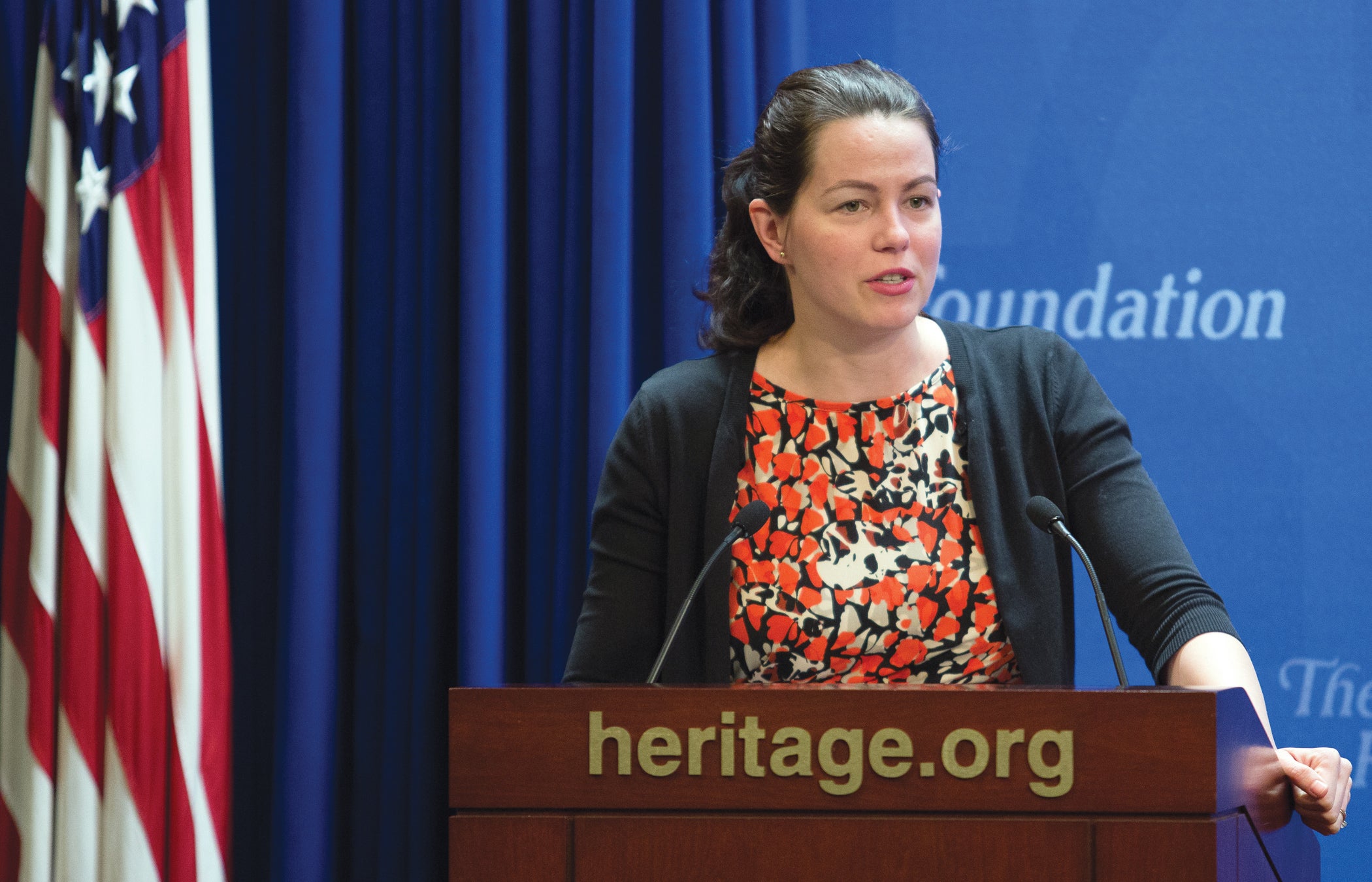The Kathryn & Shelby Cullom Davis Institute for National Security & Foreign Policy
Brett D. Schaefer notched several wins in his ongoing battle to protect national sovereignty and make the United Nations live up to its own ideals.
Standing for Sovereignty, Strength, and Principle
The U.N. Human Rights Council is supposed to focus on advancing human rights, but as our Thatcher Center’s Brett D. Schaefer has documented for years, it seldom does.
Rather, as Schaefer notes, the council is “heavily biased against Israel and plagued by a membership list that includes some of the world’s worst human rights violators and dictatorships.”
In June, the Trump administration acted on Schaefer’s long-standing recommendation and withdrew from the council, just as it had followed his recommendation to pull out of what had become a chronically mismanaged and criminally negligent UNESCO in 2017.
The editor of ConUNdrum: The Limits of the United Nations and the Search for Alternatives, Schaefer has spent more than a decade studying the U.N. and exposing the corruption that riddles so many of its programs.
And before 2018 came to a close, he had notched several more victories at Turtle Bay. The administration rejected two U.N. migration and refugee compacts that would have undermined U.S. sovereignty and cut U.S. support for the U.N. Relief and Works Agency for Palestine Refugees and the Palestinian Authority.
Davis Institute 2018 Highlights

Senator Joni Ernst, R-Iowa

NATO Secretary-General Jens Stoltenberg

Senator Marco Rubio, R-Fla.
Securing Borders Abroad and at Home
Also making a difference was Margaret Thatcher Fellow Robin Simcox, curator of Heritage’s database documenting every terror attack in Europe since January 2014. Simcox analyzes these data to identify evolving trends in terrorist strategies, and European leaders now regularly seek his advice about what to expect from terrorist groups and how to stop them.
In April he testified before the House Foreign Affairs Committee about the painful lesson Europe has learned: that terrorists exploit mass migration and lax immigration policies to spread death and destruction.
Throughout the year, Homeland Security Policy Analyst David Inserra and Ana Rosa Quintana, a senior policy analyst in our Allison Center for Foreign Policy Studies, hammered home the message that restoring order at our border requires action on both foreign and domestic fronts.
While helping shore up economic and political stability to our south, we must also fix and enforce our laws to deter illegal immigration, keep families together by quickly returning parents and children to their home countries, and help those with legitimate asylum claims. Davis Institute experts have prescribed precisely how lawmakers can do this and also create a merit-based immigration system that respects U.S. citizens and the rule of law.
Fighting for a Stronger Military
What publication sits on the desk of nearly every member of the House and Senate Armed Services Committees? Answer: The Index of U.S. Military Strength.
The 2019 Index contained bad news: in terms of our ability to fight and win two regional conflicts simultaneously, U.S. military strength continues to be “marginal.”
That assessment, unchanged from the original Index published in 2015, was validated in November, when the National Defense Strategy Commission released its report: “Providing for the Common Defense.” Echoing Heritage, the bipartisan commission concluded that the U.S. has largely lost its military edge over its rivals, and that Washington isn’t moving fast enough, or investing enough, to regain it.
The good news is that the Index series has inspired the president and Congress to increase defense spending. Funding for the military increased by $70 billion in fiscal year 2018. The 2019 budget raised it again, by another $16 billion.
Shortly before leaving office, Defense Secretary James Mattis called for 5 percent growth in real military spending each year through 2023—a proposal fully in line with Heritage recommendations.
Of course, more spending doesn’t automatically translate into a better military. And understanding where to begin in rebuilding our armed forces—and how to prepare for future conflicts—is an enormous and complex undertaking.
Enter, the Davis Institute’s “Rebuilding America’s Military Project” or RAMP. The project outlines a practical approach to reconstituting the nation’s military might.
The first RAMP report, “Rebuilding America’s Military: Thinking About the Future,” debuted in July. It laid out the principles for building a force sufficiently modern, mentally agile, spiritually resilient, and culturally confident to prevail in war—regardless of the nature of the enemy or the circumstances of combat.
The remaining four special reports will set forth detailed recommendations for each of the four armed services. RAMP is the biggest defense project The Heritage Foundation has undertaken since our ideas became the basis for President Ronald Reagan’s Strategic Defense Initiative (SDI) in the mid-‘80s.
Looking to Asia
At the start of 2018, few imagined that the leader of the free world and the leader of the world’s most secretive and repressed country would be shaking hands. Yet that’s what happened at the Trump-Kim summit in Singapore.
Throughout 2018, experts in our Asian Studies Center worked to keep the Trump administration focused on the ultimate goals with North Korea: complete and verifiable denuclearization and an end to President Kim Jong-un’s horrific human rights violations.
Heritage was the only major think tank on scene in Singapore. Policy Analyst Olivia Enos stood just feet away as Kim Jong-un’s motorcade pulled up to the meeting place. And before the summit was over, she had given more than 37 media interviews highlighting the need to keep human rights on the summit agenda.
Meanwhile, Senior Research Fellow Bruce Klingner, a former CIA deputy division chief for the Koreas, provided both Washington officials and our Asian allies with valuable advice on the nuclear negotiations. His consistent message: The U.S. must not concede anything or remove any sanctions until North Korea takes verifiable steps to denuclearize.
Return to the High Frontier?
President Trump surprised the national security community a second time when he suggested creating a new military branch: a Space Corps.
Many pundits immediately jumped on the president for trying to “militarize space.” But as Senior Research Fellow Dean Cheng calmly pointed out, the U.S. is likely years behind Russia and China in space-based war fighting and defense capabilities.
Space can be the launch point for any number of attacks, from anti-satellite missiles and lasers to cyber and jammer threats. Such tactics are certainly not anathema to Beijing and Moscow—or Tehran and Pyongyang, for that matter. Suddenly, a Space Corps doesn’t seem like such a wild idea.
In February 2018, Vice President Mike Pence chose Cheng to serve on the National Space Council Users’ Advisory Group—the NASA “think tank” relaunched to guide the president’s thinking on how best to renew and advance American leadership in space. The group delivered its formal recommendations to establish, fund, and coordinate the new Space Council in October.
Meanwhile, back on Earth, Executive Vice President Kim Holmes spoke on panels with Middle Eastern foreign ministers and the U.S. undersecretary of state at the high-level “Mediterranean Dialogues” convened in Rome, Italy. And back at Heritage HQ, he and President Kay Coles James received visits from five foreign ambassadors and more than 30 other high government officials representing U.S. allies and partners.



